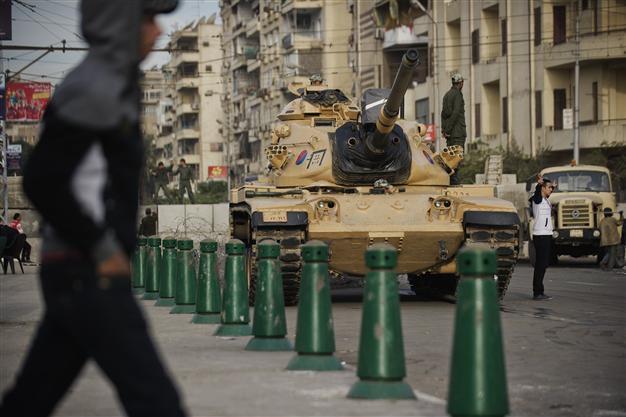Egypt opposition mulls key Morsi concession
CAIRO - Reuters

An Egyptian man walks past an army tank deployed outside of the Egyptian presidential palace in Cairo on December 9, 2012. AFP photo
The Egyptian opposition considered Sunday whether to maintain mass protests against President Mohamed Morsi after the Islamist leader announced a key concession in the political crisis dividing the country.A Morsi aide said the president had agreed "from this moment" to give up expanded powers he assumed last month that gave him immunity from judicial oversight.
However, in a meeting with other political figures on Saturday, Morsi said he would still press ahead with a December 15 referendum on a controversial new constitution drafted by a panel dominated by his Islamist allies.
The opposition coalition, the National Salvation Front, was to meet in the early evening to discuss its position on the announcement, one of its leaders told AFP, asking not to be named.
But even ahead of the talks, member groups were already voicing rejection of Morsi's concession, insisting it did not go far enough.
The April 6 Youth Movement dismissed it as "a political manoeuvre aimed at duping the people" and called for continued protests to stop "the referendum on the constitution of the Muslim Brotherhood." Prominent opposition leader Mohamed ElBaradei -- a former UN atomic agency chief and a Nobel Peace laureate -- tweeted after Morsi's announcement that "a constitution that curtails our rights and freedoms is a constitution we will topple." Demonstrators furious at what they saw as a power grab by Morsi and the railroading of the draft constitution have held weeks of street rallies whose demands have escalated into calls for the president's resignation.
On Wednesday, vicious clashes erupted between pro- and anti-Morsi demonstrators outside the presidential palace that left seven people dead and more than 600 injured.
Egypt's powerful army stepped in, deploying tanks and troops around the palace. Soldiers were reinforcing barricades on access roads early on Sunday, piling up concrete blocks three metres (10 feet) high, an AFP correspondent reported.
Air force F-16 fighter jets also made low passes over the city centre, AFP correspondents reported. There was no immediate word from the military on the reason for the overflight.
On Saturday, the military issued its first statement since the start of the crisis, urging the rival political camps to get together for talks to stop Egypt descending "into a dark tunnel with disastrous results".
"That is something we will not allow," it said.
Hours after that ultimatum, Morsi announced through his adviser, Selim al-Awa, that he was annulling the November 22 decree expanding his powers.
But the referendum scheduled for next Saturday would still go ahead, Awa said in a news conference at the presidential palace. He said that Morsi was constitutionally bound to keep to that date as the law requires a vote to be held within two weeks of the president receiving the text.
The opposition has consistently demanded both the decree and the referendum be scrapped before it would entertain starting a dialogue with Morsi.
It rebuffed an offer by the president last Thursday for talks because he had defiantly defended the decree and said the referendum would take place and the country would have to accept the result.
The Egyptian press was divided about the prospects for an end to the crisis.
"The crisis persists," said the independent daily Al-Watan.
But state-owned Al-Akhbar described Morsi's move as "positive".
Opposition figures have denounced the draft charter as weakening protection of human rights and the rights of women and religious minorities.
Those criticisms were echoed last week by UN human rights chief Navi Pillay. "I believe people are right to be very concerned," she said.
Analysts have said the referendum will likely see the draft constitution adopted, given still strong public support for Morsi and the organisation skills of the Muslim Brotherhood.
But they warned the effects of that would be damaging.
"The Muslim Brotherhood believes that it has majority support so it can win the constitutional referendum," said Eric Trager, analyst at the Washington Institute for Near East Policy.
If that occurred, it would "set up the country for prolonged instability," he warned.
In Cairo's Tahrir Square, a focal point for hardcore protesters, news of the cancellation of the decree sparked no celebrations. "This will change nothing," said one anti-Morsi activist, Mohamed Shakir, 50.
Morsi backs down in Egypt crisis after army ultimatum
Egyptian President Mohamed Morsi on Saturday backed down in a dire political crisis marked by weeks of street protests, after the powerful army gave an ultimatum to him and the opposition to sit down for talks.
But it was not immediately clear whether his concession would satisfy an increasingly fierce opposition.
















